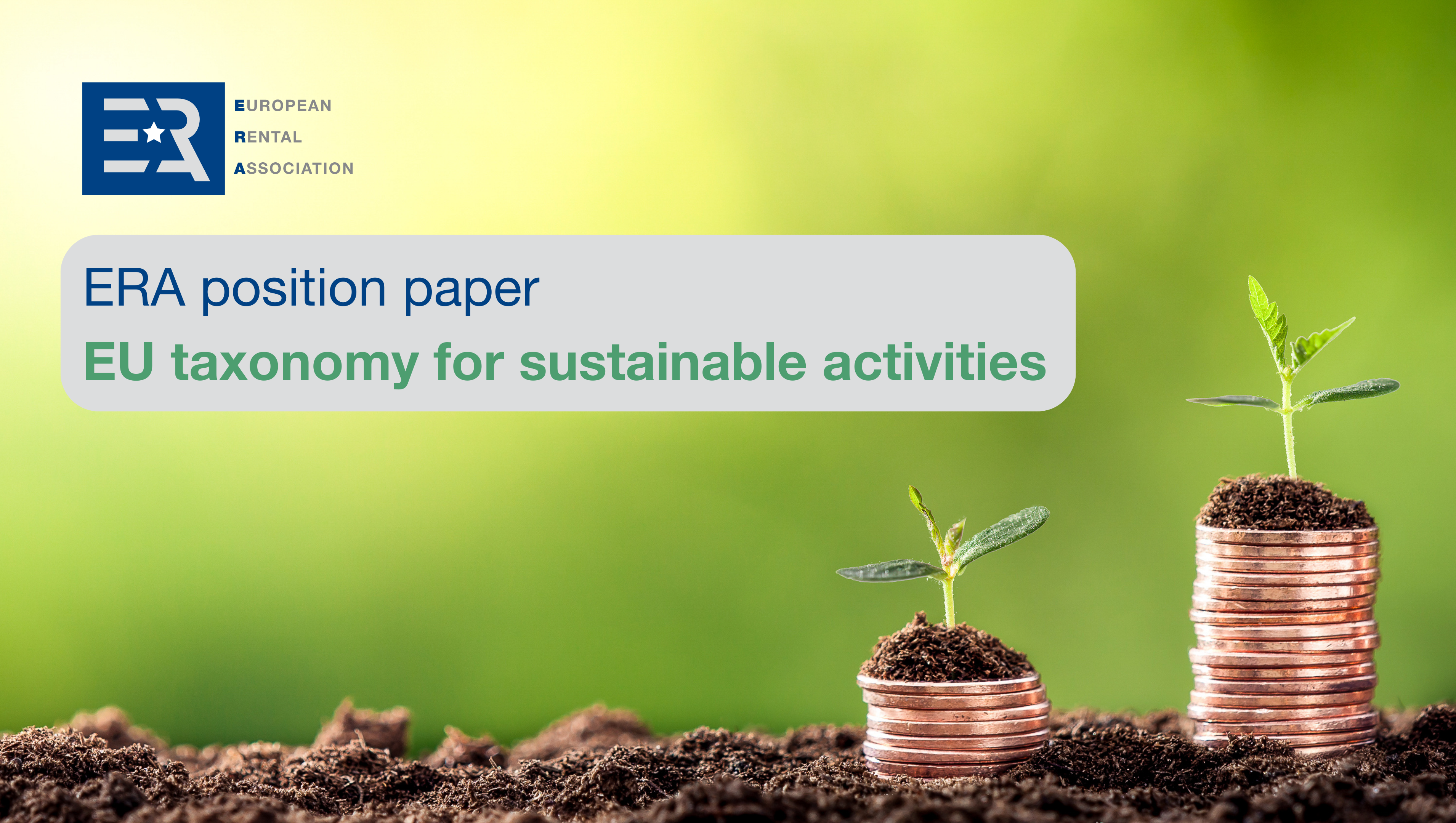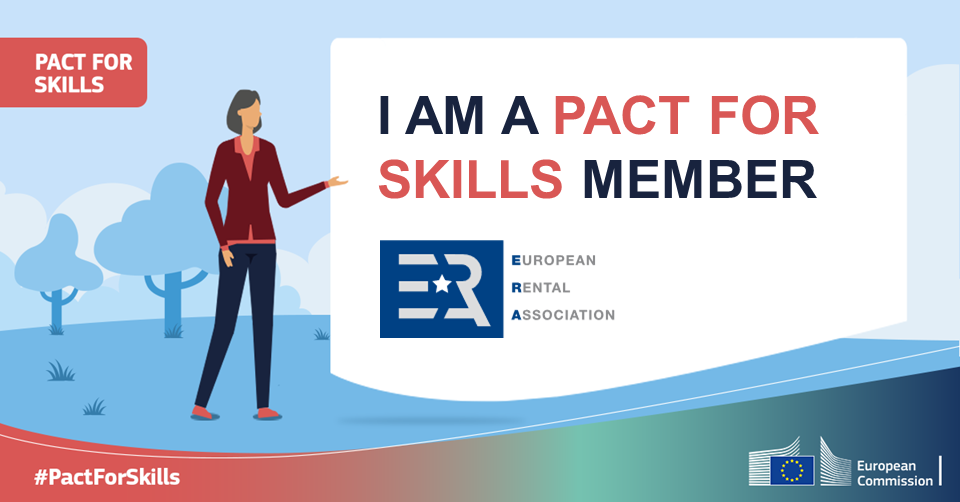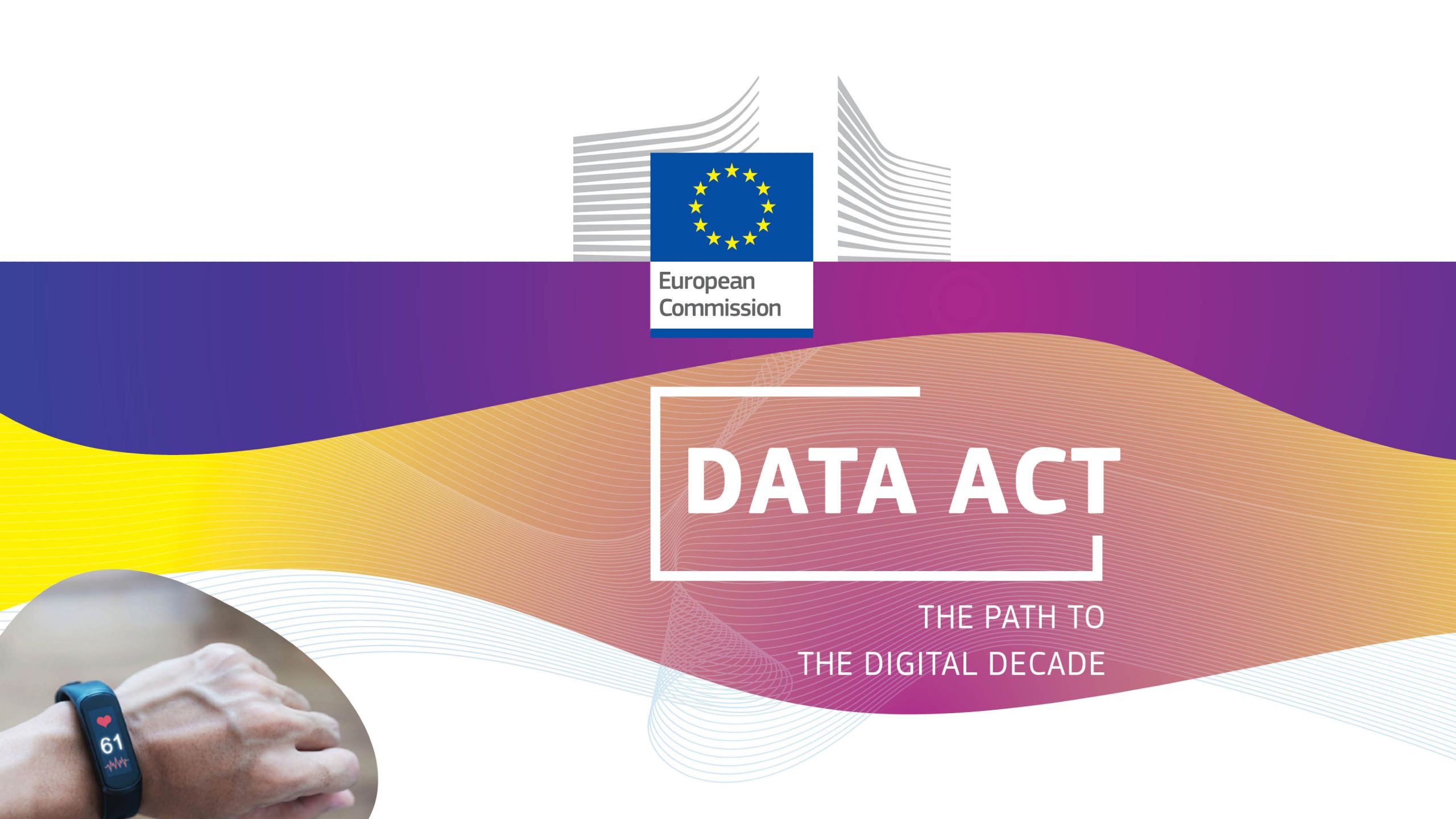
This edition of ERA Public Affairs newsletter covers the following topics:
-
- EU Environmental Taxonomy for Sustainable Activities
- EU Pact for Skils
- Data Act
If you have comments or questions, do not hesitate to contact us at [email protected].

EU Environmental Taxonomy: A Game-Changer for Rental Businesses
On 27 June 2023, the European Commission adopted the final delegated act for economic activities substantially contributing to the 4 environmental objectives of the EU taxonomy. In its Annex 2, rental is recognised as one of the business models substantially contributing to the transition to a circular economy.
Taxonomy delegated act – pros and cons for rental industry
For the first time ever, the rental model is recognised by an official EU document as a sustainable business model. According to the delegated act, rental equipment is part of the “Product-as-a-service and other circular use- and result-oriented service models” part of the circular economy. This recognition will help in promoting the rental business and in all future ERA advocacy.
Moreover, the “substantial contribution criteria” has been improved in comparison with the draft version of the delegated act. The criteria no longer require rental companies to prove to be twice as efficient in terms of the lifespan or intensity of use of rented products. The final version of these criteria are now lighter, only requiring rented products to be more efficient in practice.
However, the list of products recognised by the delegated act as eligible for taxonomy alignment under rental activity remains incomplete. The most important omission is the exclusion of construction machinery.
This means that when reporting on taxonomy, rental companies will need to exclude the portion of their turnover coming from renting construction equipment (and renting other non-eligible products) and investment into these types of equipment, from the taxonomy alignment.
- Equipment covered by delegated act for Taxonomy alignment: Hand tools, lifting and material handling equipment, powered access equipment, modular containers (steel and wood based), lighting towers, clean power generators (with emissions below 270g CO2e/kWh)
- Equipment excluded by delegated act from Taxonomy alignment: Construction machinery, agricultural and forestry machinery, and pumps and compressors
Taxonomy reporting requirements
Since the revision of the Non-Financial Reporting Directive (revised by the Corporate Sustainability Reporting Directive – CSRD), the reporting requirement of the Taxonomy Regulation will apply to all large companies with more than 250 employees (no longer over 500 employees as under NFRD), or listed SMEs or companies with a net turnover of more than €40 million and balance sheet total assets greater than €20 million.
Specifically, the requirement will apply:
- From 1 January 2024 to large public-interest companies (with over 500 employees) already subject to the Non-Financial Reporting Directive (NFRD), with reports due in 2025.
- From 1 January 2025 to all large companies (more than 250 employees and/or €40 million in turnover and/or €20 million in total assets), with reports due in 2026.
- From 1 January 2026 to listed SMEs with reports due in 2027. These SMEs can still opt-out until 2028. Other SMEs (fewer than 250 employees) are not in scope of the legislation.
Concerned companies will have to make mandatory disclosures in their non-financial reporting (annual report or sustainability report), on the taxonomy alignment of three KPIs: turnover, capital expenditure and operation expenditure.
Independent of the applicability of regulatory reporting requirements, banks and investors will increasingly require taxonomy-relevant information from companies to fulfil their sustainable finance obligations.
1. The proportion of company turnover aligned with the taxonomy:
Companies will have to determine the proportion of their turnover that is aligned with the Taxonomy. First, companies must make the distinction between how much of their revenue comes from eligible and non-eligible products. Additionally, they will have to take into consideration other revenue from additional business activities such as the sale of used machines to a second-hand market and the sale of spare parts of eligible products (which are also taxonomy aligned activities).
2. Capital expenditure (CapEx) and Operation expenditure (OpEx) aligned with the taxonomy
To comply with the EU Taxonomy, companies have to disclose the present (and anticipated) proportions of their capital expenditures related to the assets or procedures connected to either Taxonomy-aligned economic activity. Concerning OpEx, rental companies will have to take into consideration investment into the maintenance and repair of the eligible equipment.
ERA advocacy and next steps
ERA has contributed on several occasions to the European Commission’s public consultation on EU environmental taxonomy, pushing for the broadest possible recognition of rental as a sustainable business model. ERA has also communicated its position paper with detailed comments to the European Commission and calls on the European Commission to have a substantive discussion before the delegated act is adopted. Finally, a meeting was held with the responsible DG FISMA of the Commission on 17 July 2023.
The Commission recognised that being under time pressure (the delegated act needed to be in place well before the end of 2023) and under pressure from hundreds of different stakeholders, they did not have the capacity to take into account specific comments from each industry in this version of the delegated act. For example, they did not understand that by excluding all motor vehicles (with the aim to exclude car rental from taxonomy eligibility) they are also excluding the rental of most construction and other machinery.
They further acknowledged that more information will be needed from stakeholders, such as ERA, to understand the realities of the industry.
This autumn, the Commission launched an online survey on potential revisions of existing activities that are already covered in an EU Taxonomy Delegated Act in force. Through this stakeholder mechanism, stakeholders can make requests for additions to improve the taxonomy delegated acts.
ERA has submitted a request to enlarge the coverage of rental with construction machinery and other types of equipment.

EU Skills 2023: opportunities for Rental Companies
The EU Skills Initiative is a programme launched by the European Union in May 2023 to enhance the skills of individuals across various sectors. This initiative aims to raise awareness and emphasise the importance of skills development and lifelong learning across the European Union.
The European Year of Skills intends to promote the value of acquiring and improving skills among individuals, businesses and society as a whole. It seeks to address the challenges posed by rapid technological advancement, cybersecurity, globalisation, demographic changes and labour shortages.
According to the European Labour Authority in its report entitled “Report on labour shortages and surpluses”, 28 occupations were classified as having skills shortages in 2021, including the construction and service sectors.
Therefore, EU Skills seeks to enhance cooperation and collaboration between different stakeholders, such as institutions, training providers, employers and policy-makers.
The European Commission has set up objectives for 2025 which are to increase:
- Participation of adults aged 25-64 in learning over a period of 12 months: 50% (+32% from today)
- Participation of low-qualified adults aged 25-64 in learning over a period of 12 months: 30% (+67% from today)
- Share of unemployed adults 25-64 with a recent learning experience: 20% (+82% from today)
- Share of 16-74 year olds having at least basic digital skills: 70% (+25% from today)
ERA Joins the EU Pact for Skills
To support a fair and resilient recovery and deliver on the ambitions of the green and digital transitions and of the EU industrial and SME strategies, the Commission invites public and private organisations to join forces and take concrete action to upskill and reskill people in Europe. It concerns companies, workers, national, regional and local authorities, social partners, cross-industry and sectoral organisations, education and training providers, chambers of commerce and employment services.
In November 2023, ERA officially joined the EU Pact for Skills, aligning with the European Skills Agenda. ERA’s participation underscores its commitment to advancing skills and knowledge within the rental industry, contributing to future growth and success.
ERA’s participation in the Pact for Skills aligns with ongoing ERA projects on attracting and retaining talent and highlights the fact that skills and knowledge are driving forces for growth in the rental industry.
Projects in the future
1) Initiative on individual learning accounts
Individual learning accounts are personal accounts that provide people with training entitlements. People can use their entitlements to develop new skills on their jobs or to prepare for new jobs.
The Commission will assess how a possible European initiative on individual learning accounts could help to close existing gaps in access to training and empower people to switch jobs or change careers.
This initiative will enable employees to progress in their jobs and develop new skills related to the sector and its various professions.
2) A European approach to micro-credentials
As explained by the European Commission, a micro-credential captures a small unit of learning and is awarded after a short course or module is completed and the acquired competences are assessed. Higher education institutions can offer micro-credentials in a formal way or as a non-formal document, most often in electronic form. Typically, micro-credentials are given by the public or private organisation that delivered the short course or by a related sectoral or trade organisation.
The Commission will develop European standards for the quality and transparency of micro-credentials, so that they can be trusted, recognised and used throughout the European labour market and the European Education Area. As a way of giving a trusted and understood value to short training, they have great potential to help people improve or gain new skills throughout their careers and with the flexibility they need.
3) Unveiling a Robust Skills and Talent Mobility Framework
The European Commission has unveiled a groundbreaking Skills and Talent Mobility package, signalling a strategic move to enhance the EU’s global competitiveness. At its core is the pioneering EU Talent Pool – a dynamic platform connecting EU employers with jobseekers from non-EU countries in fields facing shortages. This voluntary platform promises to simplify international recruitment, providing valuable information on migration procedures and ensuring ethical practices. The package, addressing both domestic upskilling and global talent attraction, aims to confront persistent skill shortages. Additionally, it accelerates the recognition of skills from third countries and advocates for increased learning mobility within the EU, marking a significant milestone in the European Year of Skills.

Data Act Officially Adopted by European Parliament
The European Parliament has officially adopted the final text of the Data Act during its November 2023 plenary session with overwhelming support – 481 votes in favour, 31 against and 71 abstentions. The Act, resulting from interinstitutional negotiations, had reached a political agreement in June 2023 following trilogue negotiations. The final text is expected to be formally adopted by the Council, paving the way for publication in the Official Journal of the EU. The Data Act will come into force on the twentieth day after publication.
The recently adopted European Data Act aims to eliminate barriers hindering consumers and businesses from accessing data. Specifically, this legislation establishes regulations dictating who can utilise and access data generated by users and devices within the EU, specifying the purposes and terms to ensure equitable opportunities and foster a competitive data market.
The comprehensive framework encompasses several crucial points:
- Rights for Users of Connected Devices: Individuals and businesses using connected devices, such as vehicles and home equipment, gain explicit rights to access and share data generated by these devices and related services. Manufacturers must design devices to facilitate the exercise of these rights.
- Manufacturer Discretion and Trade Secrets: Manufacturers, acting as data holders, have the authority to withhold or suspend data sharing, particularly when the confidentiality of trade secrets is at risk. They can also refuse access to their data on a case-by-case basis.
- Public Sector Access to Private Sector Data: Private sector data is mandated to be shared with public sector bodies and institutions in the EU under exceptional circumstances, such as public emergencies (e.g. floods and major cybersecurity incidents). Access to data is also allowed for tasks in the public interest as provided by law (e.g. official statistics) and for specific research purposes.
- Requirements for Cloud Providers: New requirements imposed on cloud providers aim to ensure that customers have the flexibility to switch between providers without being locked in. This empowers customers to negotiate contracts more effectively.
- Safeguards and Interoperability Measures: The Data Act includes safeguards against unlawful international data transfers, aligning with privacy concerns. Additionally, measures are introduced to promote the development of interoperability standards for data sharing and processing, in line with the EU standardisation strategy.
- Enforceability Timeline: The new rules are expected to become enforceable around mid-2025. This extended timeline, from the initially proposed 12 months to 20 months, provides the industry with additional time to adapt to the regulatory changes.
